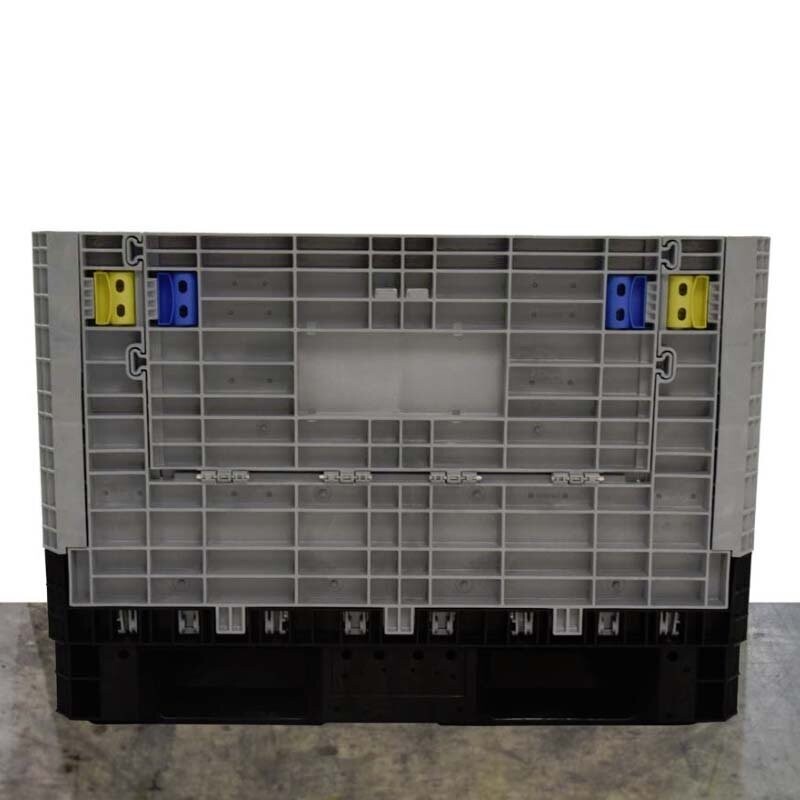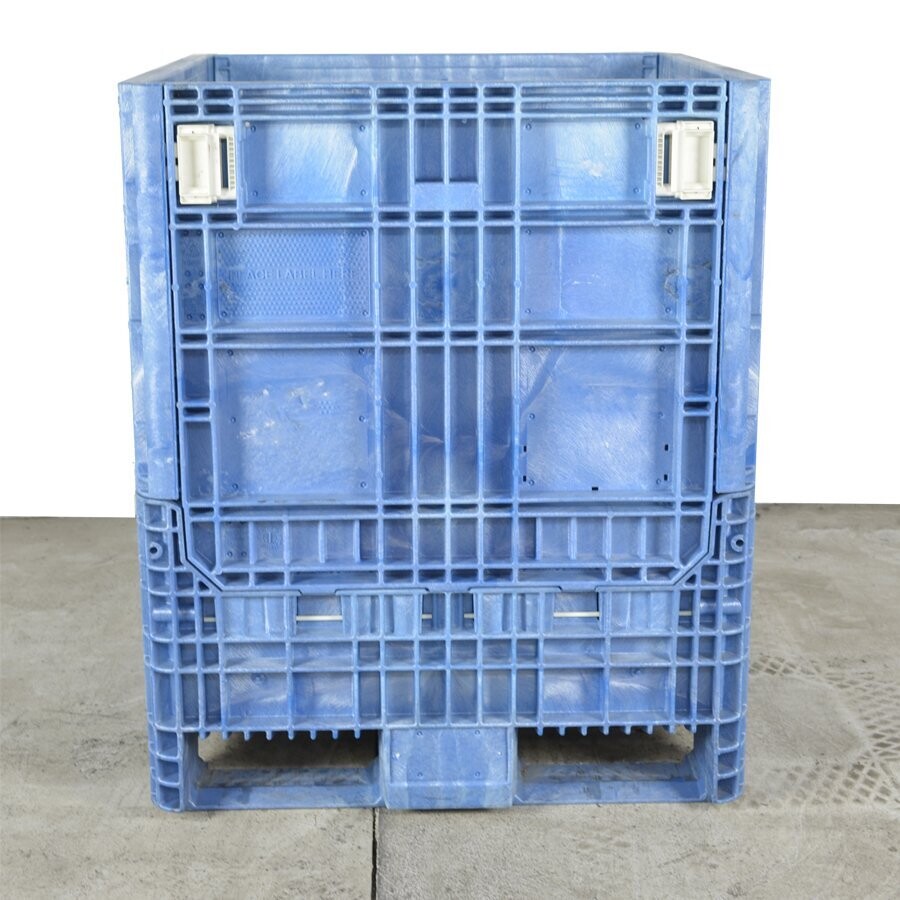How Mass Containers Can Boost Performance in Your Product Packaging Workflow
Mass containers play a crucial role in maximizing packaging procedures. Their style makes it possible for far better use of vertical space and advertises arranged stock monitoring. This effectiveness leads to minimized product replenishment frequency and lower labor prices. Additionally, the durability of these containers lessens item damages. As services look for methods to boost their procedures, recognizing the complex benefits of mass containers becomes essential. What various other advantages might they bring to the table?
Structured Storage Solutions
As companies seek to enhance their procedures, streamlined storage space solutions have actually ended up being vital for improving packaging effectiveness. Reliable storage space not only saves room but also helps with quicker accessibility to materials, which is crucial in fast-paced production settings. Bulk containers, developed for simple piling and company, considerably lower the complexity of storage systems. They enable organizations to make best use of vertical space while lessening the impact needed for supply.
Additionally, these containers typically include ergonomic styles that streamline taking care of and transport, minimizing the threat of injury and boosting operations. By settling materials in mass containers, firms can lower the regularity of restocking and simplify their supply chain procedures. On the whole, the application of effective storage remedies cultivates an extra well organized work space, bring about boosted efficiency and reduced functional prices. Via thoughtful style and tactical use of mass containers, organizations can accomplish significant improvements in their product packaging procedures.

Waste Decrease and Sustainability
While the search of effectiveness frequently drives packaging decisions, waste decrease and sustainability have actually arised as necessary considerations in modern procedures. Firms significantly identify that adopting mass containers can considerably lessen product waste. These containers typically make use of less product packaging material than conventional techniques, causing a smaller carbon footprint.
Furthermore, bulk containers can be recycled numerous times, which better reduces the need for single-use product packaging and lowers total waste going into landfills. Their design usually allows for less complicated recycling processes, lining up with sustainability goals.
Furthermore, business that prioritize waste decrease can enhance their brand track record, attracting ecologically conscious consumers. By executing bulk containers, companies not only enhance procedures yet additionally add favorably to environmental stewardship. This dual advantage of functional efficiency and sustainability settings business positively in a competitive market progressively focused on green methods.
Enhanced Production Line Efficiency

Carrying out bulk containers on production line substantially boosts effectiveness by improving the handling and transportation of materials. By utilizing mass containers, makers can decrease the regularity of material replenishment, allowing employees to concentrate on assembly jobs instead than consistent stock monitoring. This results in less disruptions and a smoother workflow, eventually boosting productivity.
Furthermore, mass containers are created for very easy combination with automated systems, additionally optimizing the assembly procedure. Their standard shapes and sizes promote better organization, allowing employees to locate and gain access to materials rapidly. This reduction in search time adds to an extra fluid manufacturing environment.

Cost Cost Savings and Improved Revenue Margins
Remarkable cost financial savings can be understood through the fostering of bulk containers in packaging procedures. By reducing the requirement for multiple smaller bundles, firms can reduce material costs significantly. Mass containers typically require much less product packaging material on the whole, resulting in lower expenses on materials. In addition, the efficiency of bulk handling minimizes labor costs connected with packing and unpacking, additionally enhancing cost savings.
Fewer trips to vendors and reduced transportation expenses are likewise vital advantages, as mass containers enable boosted item ability per delivery. This greater quantity not just reduces down on delivery expenditures yet additionally enhances storage area within centers, bring about boosted supply management.
Furthermore, the sturdiness of bulk containers typically equates to lower damage rates throughout handling and transportation, maintaining product integrity and decreasing waste. Jointly, these aspects contribute to better profit margins, making bulk containers a financially helpful choice for organizations seeking performance in their product packaging operations.
Convenience Throughout Industries
Bulk containers supply remarkable convenience across different sectors, making them a valuable asset past simply cost savings. In the food and drink industry, these containers help with the secure transport and storage of huge quantities of active ingredients, improving efficiency in manufacturing lines. In drugs, mass containers ensure compliance with stringent health standards while suiting the mass handling of raw products. The chemical market likewise benefits, as these containers hold up against rough materials and stop contamination, sustaining risk-free operations. used collapsible containers. Furthermore, the agricultural sector makes use of mass containers for moving grains and plant foods, reducing and maximizing logistics waste. Their flexibility encompasses manufacturing, where bulk containers simplify setting up processes and lower the requirement for excessive packaging. This cross-industry capability not only improves operational efficiency yet likewise promotes sustainability through minimized product packaging waste, illustrating the integral function bulk containers play in modern supply chains
Regularly Asked Inquiries
Exactly How Do Mass Containers Effect Staff Member Security in Product Packaging Workflow?
Bulk containers considerably enhance worker safety in packaging operations by lowering hand-operated handling, reducing injury dangers, and promoting ergonomic practices. Their layout promotes more secure transportation and storage space, inevitably developing an extra safe and secure workplace for all employees.
What Materials Are Bulk Containers Usually Made From?
Bulk containers are usually made from sturdy products such as high-density polyethylene, metal, polypropylene, or wood - used collapsible bulk containers. These materials provide strength, resistance to environmental factors, and suitability for various materials, making sure risk-free and reliable used bulk containers transport of products
Can Mass Containers Be Customized for Certain Products?
Yes, bulk containers can be tailored for details items. Suppliers typically customize measurements, products, and features to meet special requirements, making certain ideal protection and efficiency throughout storage and transport of various goods.
Exactly How Do Mass Containers Affect Transportation Logistics?
Bulk containers improve transportation logistics by making the most of freight space, decreasing the variety of trips required, and minimizing dealing with prices (used collapsible containers). Their standardized dimensions promote efficient dumping and loading, eventually leading to enhanced operational effectiveness throughout the supply chain
What Is the Life-span of Mass Containers in Routine Use?
The life-span of mass containers in normal usage generally varies from 5 to 10 years, relying on worldly quality, dealing with methods, and ecological problems. Appropriate upkeep can substantially expand their functionality and performance.
Applying mass containers on setting up lines substantially enhances performance by simplifying the handling and transport of products. Mass containers often require much less product packaging product on the whole, resulting in reduced expenditures on supplies. In drugs, mass containers ensure compliance with rigid hygiene requirements while accommodating the mass handling of raw products. Their flexibility prolongs to production, where mass containers improve assembly procedures and reduce the requirement for too much product packaging. Bulk containers considerably improve employee safety and security in packaging operations by reducing hands-on handling, reducing injury threats, and promoting ergonomic techniques.